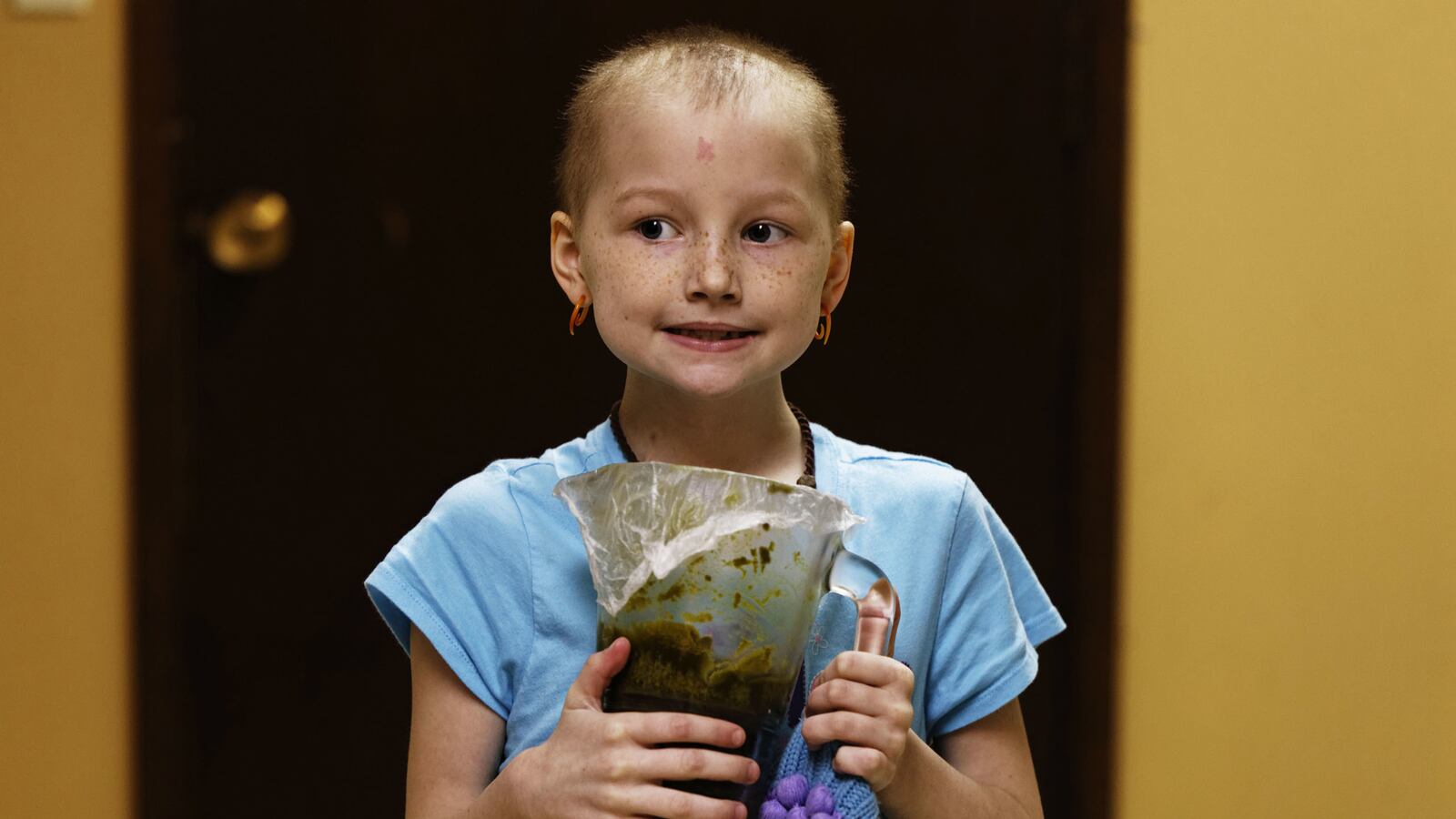MILWAUKIE, Ore. — Two weeks ago, Mykayla Comstock was an ordinary 7-year-old girl living through an extraordinary ordeal. She’s been battling leukemia since June, when a basketball-size tumor was discovered in her chest.

Now Mykayla is in the middle of another battle—and in the national spotlight—over whether children should be able to use marijuana to mitigate the crippling effects of chemotherapy. A newly registered member of the state’s Medical Marijuana Program, she has consumed a daily gram of cannabis oil, encapsulated in a pill, since shortly after her diagnosis. The leukemia quickly went into remission, say Mykayla’s unapologetic parents, and in the months that followed she has been able to cope with the debilitating symptoms associated with her traditional cancer treatments.
She also likes the way cannabis makes her laugh.
“It’s like everything’s funny to me,” she tells The Daily Beast.
Mykayla’s controversial but perfectly legal cannabis use rose to national attention late last month when an Oregonian reporter wrote a piece on her after discovering her Facebook page. The story quickly went viral, and Mykayla’s mother, Erin Purchase, says she’s since fielded phone calls from producers from Dr. Phil and Anderson Cooper. Local television reporters also bang incessantly on the family’s door in Gladstone, Ore., she says.
Purchase says she never sought or anticipated this kind of attention. She and her boyfriend, Brandon Krenzler, whom Mykayla calls “daddy,” always knew they would obtain a medical marijuana card if their daughter needed one, she says. When oncologists diagnosed the 7-year-old with an aggressive form of cancer known as T-cell leukemia earlier this summer, Purchase and Krenzler drove Mykayla to The Hemp and Cannabis Foundation clinic in Southeast Portland and got her enrolled in the state program.
Purchase and Krenzler tell The Daily Beast they aren’t the least bit embarrassed or ashamed of their actions. They’re convinced the cannabis oil their daughter now ingests in two pills each day not only has mitigated the effects of her chemotherapy but also perhaps knocked her leukemia into remission. But they made sure those early visits to the clinic where Mykayla gets her medicine were “discreet,” through a side entrance, they say. They did not tell the girl’s biological father, who they say has been out of touch for most of the child’s life. They kept it quiet, to themselves.
Now they’re famous. And they’re being attacked, they say, by people who don’t understand the power of marijuana as medicine, who call them lousy parents, who’ve seized on the comment Jesse Comstock, the girl’s biological father, made in that first newspaper article—that he visited in August and found his daughter “stoned out of her mind.”

Comstock couldn’t be reached for comment for this story, but he’s not the only one nonplussed that each month little Mykayla consumes the distilled equivalent of a pound of marijuana, which remains classified by the federal government as a Schedule 1 narcotic, right up there with LSD and heroin. Purchase and Krenzler say the oncologist who was treating Mykayla “blew up on us” when she found out about the cannabis use and that the doctor-patient relationship became so strained they asked for a new provider. (Neither the girl’s new oncologist nor her previous doctor returned phone calls from The Daily Beast.) The couple—he a handyman in between “technical” jobs, she a hemp jewelry maker—also say they’ve received vile emails from people declaring them not just unfit parents but also deserving of jail time.
“I hope they never have to be who I am,” Purchase says. “I hope they never have to feel what I’m having to feel, what she’s having to feel. I’m not drugging my child. I use this for her medicine. It’s amazing, and I think people should know that.”
But the two have discovered something else about being in the national spotlight: an overwhelming show of support, from all over the country. The number of “likes” on Mykayla’s Facebook page has tripled in the past few weeks, to 5,000. A call for donations to help the couple replace their broken-down car hit $2,000 last week, only a few days after the “Fairy Godparent Car Rally” began.
One of Mykayla’s roommates also gives her $1 every time she muscles down a shot of “cannabis juice,” a liquid derived from the plant that has no intoxicating effects—because it isn’t heated—but is unpalatable. Mykayla says she’s saving those dollars for a “Build-A-Bear” she’s making for her 17-month-old sister, Ryleigh.
Those who support Mykayla’s cannabis use do so either because they’ve long believed in the plant’s healing powers or because they’re hip to mounting medical evidence that shows marijuana’s “cannabinoids” don’t just help with generalized pain, nausea, and diminished appetite but have been shown to slow cancer growth, inhibiting the formation of new blood cells that feed tumors. Some of Purchase and Krenzler’s critics are upset that they don’t treat the girl exclusively with cannabis, he says, but the couple isn’t willing to go that far.
The trouble is, there’s also research that shows marijuana use can have negative effects, especially among those who begin using the drug before they turn 18. “Persistent cannabis use” among young people was associated with “neuropsychological decline,” a Duke University survey of more than 1,000 individuals at various ages found.
Purchase and Krenzler are unbowed, though. They say their daughter is not addicted to cannabis and that she’ll only use it as long it’s necessary, as long as she’s undergoing chemo treatment or suffers from some other qualifying medical condition. They never would have given her the drug in the first place, they say, were it not authorized by the state program, as that would be illegal and could threaten Purchase’s custody agreement. Keith Comstock called police and state social workers after his August visit, but because the girl was a medical-marijuana patient, the agencies just conducted a welfare check.
Mykayla’s parents tell their critics to consider the alternatives for pain management: highly addictive prescription drugs, including oxycodone and hydrocodone. She’s been offered both, they said, for symptoms as mild as a stomachache. Thanks to her cannabis oil, Mykayla can battle occasional nausea with little more than a ginger chew, Purchase says.
“I don’t think there’s anything left to argue,” Krenzler says. “Cannabis helps cancer. Even if it doesn’t fight cancer, it fights the symptoms.”
These days, Mykayla hardly remembers what it was like that first week of chemo blasts, other than the night sweats and being “really, really bored.”





